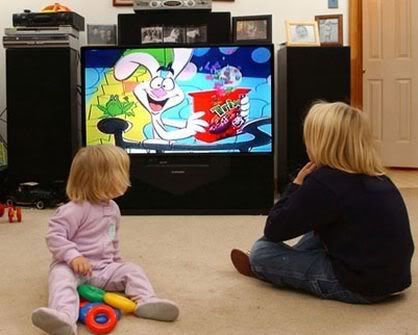 Their findings don't definitively prove that TV makes children act up, and girls seemed entirely unaffected by violent fare, according to the researchers. But the link does appear solid in the case of boys, said study lead author Dr. Dimitri Christakis, professor of pediatrics at the University of Washington, Seattle.
Their findings don't definitively prove that TV makes children act up, and girls seemed entirely unaffected by violent fare, according to the researchers. But the link does appear solid in the case of boys, said study lead author Dr. Dimitri Christakis, professor of pediatrics at the University of Washington, Seattle."If parents are really interested in their kids' behavior, they have to be very selective and thoughtful about what their children watch," Christakis said. "That requires a fair amount of education on their part. They can't think, 'It's a cartoon, and it's harmless.' They have to be more thoughtful."
A number of studies have linked violence on television to aggression among children, but the new research is unusual, because it looked at the effects of television watching on kids between the ages of 2 and 5, Christakis said.
Working with University of Washington colleague Frederick Zimmerman, Christakis reviewed data from a study of 8,000 U.S. families. They focused on the television habits of preschoolers -- 184 boys and 146 girls. The researchers then checked up on reports of the youngsters' behavior when they reached 7 and 10 years of age.
The findings are published in the November issue of the journal Pediatrics.
Christakis' team found that for each hour a day spent watching violent TV during the preschool years, boys were three times more likely to develop behavioral problems at age 7.
It's possible that boys with aggressive tendencies may simply prefer watching violent television in the first place, of course. But the study used information about the children's early behaviors to help control for that, Christakis said.
Violence on television did not seem to have any effect on the behavior of girls. Also, watching non-violent programs didn't appear to make boys or girls more aggressive later in life, the team found.
"Parents need to know what really does constitute aggression-laden programming," Christakis said. "It's not just what parents think."
Indeed, the study suggests that trouble may lurk in cartoon programming as seemingly innocuous as Power Rangers and the animated Spiderman series, he said. Conceivably, he added, even old Warner Brothers' classics, such as the Wile E. Coyote-Road Runner series, could spell trouble.
"Kids in the 2- to 5-year-old age range don't understand the difference between cartoon and real violence," Christakis explained," particularly how it shows aggression without consequence. It sends the wrong message."
Not all children, of course, will become more aggressive by simply watching such cartoons, he said, but their risk for such behavior will grow.
L. Rowell Huesmann, director of the Research Center for Group Dynamics at the University of Michigan, said the study is "very well done," even though it does not prove that TV violence causes aggression.
"While the bad behavior being predicted is still behavior in childhood, society should be concerned about this effect, because the more aggressive child tends to grow up to be the more aggressive adult," he said. "So, if TV violence is increasing the aggression of preschoolers, it is likely to increase how aggressive they will be later in life as well."
Another expert agreed.
"For children who are first learning how to properly behave, exposure to aggressive and violent behavior featured on many programs and cartoons is counterproductive," Alan Hilfer, director of psychology at Maimonides Medical Center in New York City, said in a statement. "Parents must seek to create curious, intelligent and socially skilled children -- not children whose answer to a situation is a physical or aggressive response."
But that can be a tall order for stressed out moms and dads, he added. According to Hilfer, "Even new parents are aware of the shortcomings of TV, but television has long been, and continues to be, the quintessential baby sitter when parents are overwhelmed."
Source @ Forbes

 "When you find your mind wandering, simply notice the distracting thoughts without judgment, and then refocus on what's going on with you and your partner," says Weiner-Davis. "Get back to the sensual connection by paying attention to where you're touching each other and what feels good."
"When you find your mind wandering, simply notice the distracting thoughts without judgment, and then refocus on what's going on with you and your partner," says Weiner-Davis. "Get back to the sensual connection by paying attention to where you're touching each other and what feels good."
